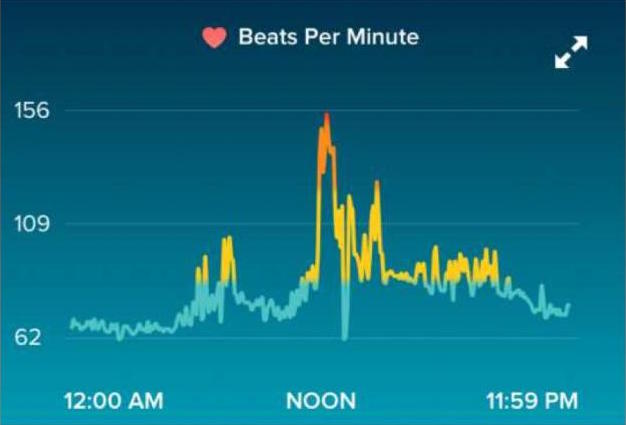Can your fitness tracker save your life in the ER?

Doctors provided strategic treatment after the man suffered a seizure.
A 42-year-old man presented to the emergency department (ED) with newly diagnosed atrial fibrillation of unknown duration. Interrogation of the patient’s wrist-worn activity tracker and smartphone application identified the onset of the arrhythmia as within the previous 3 hours, permitting electrocardioversion and discharge of the patient from the ED. Annals of Emergency Medicine.
American College of Emergency Physicians ACEP, April 5, 2016
WASHINGTON – Emergency physicians used a patient’s personal activity tracker and smartphone to identify the time his heart arrhythmia started, which allowed them to treat his new-onset atrial fibrillation with electrical cardioversion and discharge him home. The first case report using information in an activity tracker/smartphone system to assist in medical decision-making was reported online Friday in Annals of Emergency Medicine, Interrogation of Patient Activity Tracker to Assist Arrhythmia Management.
“Using the patient’s activity tracker – in this case, a Fitbit® – we were able to pinpoint exactly when the patient’s normal heart rate of 70 jumped up to 190,” said corresponding study author Alfred Sacchetti MD FACEP of Our Lady of Lourdes Medical Center in Camden NJ. “The device told us that the patient’s atrial fibrillation was present for only a few hours. That was well within the 48-hour window needed to consider him for rhythm conversion, so we cardioverted him and sent him home.”

A 42-year-old patient with a history of seizures but no history of cardiac disease or prior episodes of atrial fibrillation came to the emergency department following a seizure. He had an irregular heart rate ranging between 130 and 190 beats per minute. He was medicated with oxcarbazepine and diltiazem. His heart rate returned to normal (between 80 and 100 beats per minute) but the atrial fibrillation remained.
The treatment of recent onset atrial fibrillation is electrical cardioversion in any patient who can reliably relate an arrhythmia onset time of within the previous 48 hours. Because the patient was asymptomatic during his current episode of atrial fibrillation, it was not possible to assign an onset time for his arrhythmia.
Emergency department staff accessed the smartphone application connected with his activity tracker and discovered the onset time for his atrial fibrillation was 3 hours prior to coming to the emergency department.
After cardioverting the sedated patient, emergency department staff interrogated the smartphone app again, which accurately recorded the change in heart rate consistent with a rhythm change from atrial fibrillation to normal rhythm. The patient was discharged home with instructions to follow up with outpatient cardiology.
“Not all activity trackers measure heart rates, but this is the function of most value to medical providers,” said Dr. Sacchetti. “Dizziness with a heart rate of 180 would be approached very differently from the same complaint with a heart rate of 30. At present, activity trackers are not considered approved medical devices and use of their information to make medical decisions is at the clinician’s own discretion. However, the increased use of these devices has the potential to provide emergency physicians with objective clinical information prior to the patient’s arrival at the emergency department.”
Source American College of Emergency Physicians
Via EurekAlert!
Emergency physicians used a patient’s personal activity tracker and smart phone to identify the time his heart arrhythmia started, which allowed them to treat his new-onset atrial fibrillation with electrical cardioversion and discharge him home. Published on YouTube April 6, 2016.
Interrogation of Patient Smartphone Activity Tracker to Assist Arrhythmia Management, Rudner J, McDougall C, Sailam V, Smith M, Sacchetti A. Ann Emerg Med. 2016 Mar 29. pii: S0196-0644(16)00143-8. doi: 10.1016/j.annemergmed.2016.02.039. [Epub ahead of print]
Also see
ER docs get heart rate info from Fitbit, save patient’s life in Ars Technica
Teen’s life saved by Fitbit after device detects potentially fatal heart condition in The Daily Mirror
Fitbit faces class-action lawsuit over faulty heart monitoring in Engadget
Fitbit Charge: A solid fitness tracker you shouldn’t buy in Mashable
Can a Computer Assist in Prescribing Stroke Preventing Therapy in Patients with Atrial Fibrillation? in Newswise
